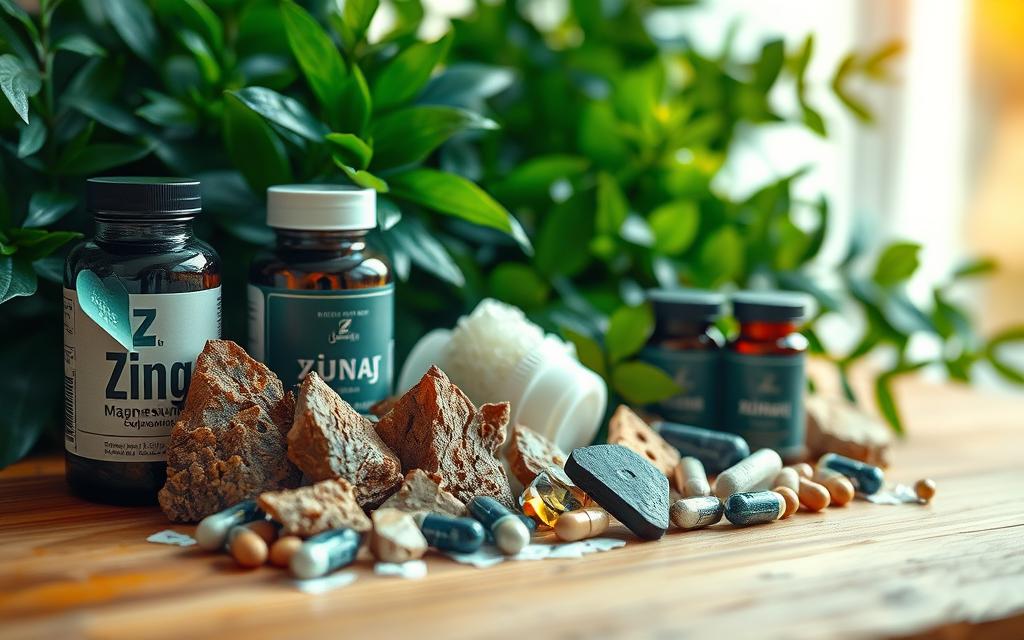Vitamins for Erectile Dysfunction: What You Need to Know
Erectile dysfunction (ED) is a growing concern worldwide, affecting millions of men. Research suggests that certain vitamins and nutrients may play a crucial role in addressing this condition. Essential nutrients like Vitamin D have been linked to sexual function and cardiovascular health, both of which are vital for overall well-being.
Studies have shown that low levels of Vitamin D are associated with the severity of ED. Additionally, other nutrients like L-arginine, L-carnitine, and Tribulus terrestris have been found to have a positive impact on erectile function. For instance, L-arginine increases nitric oxide production, which can help stimulate an erection. As highlighted in a study on Healthline, these nutrients can be beneficial in improving erectile health. Furthermore, minerals like Magnesium and Zinc support muscle function, testosterone synthesis, and overall cardiovascular health, as noted by Colorado Urologists.
Understanding Erectile Dysfunction and Its Causes
Erectile dysfunction (ED) is a complex condition that affects millions of men worldwide, causing distress and impacting quality of life. To effectively address ED, it’s crucial to understand its definition, underlying causes, and the factors that contribute to its development.
What Defines Erectile Dysfunction
Erectile dysfunction is characterized by the inability to achieve or maintain an erection sufficient for satisfactory sexual performance. This condition can be a source of significant emotional distress and can affect relationships.
Common Physical Causes
Physical causes of ED include cardiovascular disease, diabetes, obesity, and certain neurological disorders. These conditions can damage blood vessels and nerves, impairing erectile function. Cardiovascular disease, for instance, can restrict blood flow to the penis, making it difficult to achieve an erection.
| Physical Cause | Impact on Erectile Function |
|---|---|
| Cardiovascular Disease | Restricts blood flow to the penis |
| Diabetes | Damages nerves and blood vessels |
| Obesity | Increases risk of cardiovascular disease and diabetes |
Psychological Factors
Psychological factors, such as stress, anxiety, and depression, can also play a significant role in ED. These factors can affect the brain’s ability to send signals to the nerves that control erection, making it difficult to achieve or maintain an erection.
Understanding the interplay between physical and psychological factors is essential for developing effective treatment plans for ED.
The Connection Between Nutrition and Sexual Health
A well-balanced diet is essential for sexual health, influencing factors such as blood flow and hormone production. Nutritional deficiencies can lead to sexual dysfunction, including erectile dysfunction (ED).
How Vitamins Affect Blood Flow and Hormone Production
Vitamins play a crucial role in maintaining sexual health by affecting blood flow and hormone production. For instance, vitamins like B6 and B12 are involved in the production of hormones, including testosterone, which is vital for sexual function.

Nutritional Deficiencies and Their Impact on ED
Nutritional deficiencies can significantly impact erectile dysfunction. Lack of essential vitamins and minerals can lead to decreased blood flow, hormonal imbalances, and other factors that contribute to ED.
The Role of Antioxidants in Sexual Function
Antioxidants are vital in protecting against oxidative stress, which can damage blood vessels and impair sexual function. Vitamins C and E are examples of antioxidants that help maintain sexual health by ensuring proper blood flow and reducing oxidative damage.
Vitamins for Erectile Dysfunction: Research and Evidence
Recent studies have highlighted the importance of vitamins in the management and treatment of erectile dysfunction. Vitamins play a crucial role in maintaining various bodily functions that are directly related to sexual health, including blood flow, hormone production, and overall cardiovascular well-being.
Vitamin D and Testosterone Production
Vitamin D is essential for maintaining healthy testosterone levels. Research indicates that men with vitamin D deficiency are more likely to experience erectile dysfunction. A study published on the National Center for Biotechnology Information website highlights the correlation between vitamin D levels and testosterone production, suggesting that vitamin D supplementation could be beneficial for men with ED.
B Vitamins for Energy and Circulation
B vitamins are crucial for energy production and maintaining healthy circulation, both of which are vital for sexual function. B vitamins, particularly B12, play a significant role in the synthesis of red blood cells, which are essential for delivering oxygen to tissues, including those involved in erectile function.
Vitamin C for Blood Vessel Health
Vitamin C is known for its antioxidant properties and its role in maintaining the health of blood vessels. It helps in improving blood flow, which is critical for achieving and maintaining an erection. Vitamin C also supports overall cardiovascular health, further contributing to its potential benefits for men with erectile dysfunction.
Vitamin E as an Antioxidant for Sexual Health
Vitamin E is a powerful antioxidant that protects cells from damage, supporting overall health, including sexual function. Its antioxidant properties help in reducing oxidative stress, which is associated with various forms of sexual dysfunction, including erectile dysfunction.
In conclusion, vitamins D, B, C, and E each play unique roles in supporting sexual health and potentially alleviating symptoms of erectile dysfunction. Ensuring adequate intake of these vitamins through diet or supplementation could be a valuable component of a comprehensive approach to managing ED.
Minerals and Other Supplements for Sexual Function
Beyond vitamins, certain minerals and supplements play a crucial role in supporting sexual function. Erectile dysfunction (ED) is a complex condition that can be influenced by various factors, including nutritional deficiencies. Certain minerals and supplements have been studied for their potential benefits in addressing ED.
Zinc and Magnesium for Testosterone Support
Zinc and magnesium are two essential minerals that support testosterone production, a hormone critical for sexual health. Zinc is involved in numerous aspects of male reproductive health, including sperm production and testosterone regulation. Magnesium also plays a role in testosterone production and can help improve erectile function. A study on zinc supplementation showed improved testosterone levels in individuals with zinc deficiency. For more information on how minerals like zinc impact erectile dysfunction, visit Life Extension.
L-arginine and L-citrulline for Nitric Oxide Production
L-arginine and L-citrulline are amino acids that play a crucial role in the production of nitric oxide (NO), a molecule that helps to relax blood vessels and improve blood flow. Improved blood flow is essential for achieving and maintaining an erection. L-citrulline, in particular, has been shown to be effective in boosting NO production and improving erectile function. For a review of supplements like EndoPeak that contain these ingredients, check out Colorado Urologists.
Omega-3 Fatty Acids for Cardiovascular Health
Omega-3 fatty acids are known for their cardiovascular benefits, which indirectly support sexual health by improving heart health and blood flow. Omega-3s help reduce inflammation and improve vascular function, both of which are important for maintaining erectile function.
CoQ10 for Energy and Blood Flow
Coenzyme Q10 (CoQ10) is an antioxidant that helps generate energy in cells and supports overall cardiovascular health. It also plays a role in improving blood flow and reducing oxidative stress, both of which can contribute to better erectile function.

| Mineral/Supplement | Function | Benefit for ED |
|---|---|---|
| Zinc | Testosterone production | Improves testosterone levels |
| Magnesium | Testosterone production | Supports erectile function |
| L-arginine/L-citrulline | Nitric oxide production | Improves blood flow |
| Omega-3 Fatty Acids | Cardiovascular health | Enhances vascular function |
| CoQ10 | Energy production, antioxidant | Improves blood flow, reduces oxidative stress |
Safety, Dosages, and Integrating Vitamins with Other ED Treatments
To maximize the benefits of vitamins for erectile dysfunction, understanding the right dosages and potential side effects is essential. Vitamins can be a valuable addition to ED treatment plans, but their effectiveness is highly dependent on safe and informed usage.
Recommended Dosages and Potential Side Effects
Understanding the recommended dosages of vitamins for ED is crucial to avoid adverse effects. For instance, Vitamin D is generally recommended at a dosage of 600-800 IU per day, but excessive intake can lead to toxicity.
| Vitamin | Recommended Dosage | Potential Side Effects |
|---|---|---|
| Vitamin D | 600-800 IU/day | Toxicity with excessive intake |
| Vitamin B | 2.4-2.6 mg/day (B12) | Nervous system damage with excessive intake |
| Vitamin C | 60-90 mg/day | Gastrointestinal disturbances with high doses |
It’s also important to be aware of the potential side effects associated with high doses of certain vitamins. Consulting a healthcare provider before starting any supplement regimen is advisable.
Combining Supplements with Prescription Medications
When combining vitamins with prescription ED medications, caution is necessary to avoid adverse interactions. For example, L-arginine and L-citrulline can enhance nitric oxide production, but their use with PDE5 inhibitors like sildenafil should be monitored.
Lifestyle Changes That Enhance Vitamin Efficacy
Lifestyle adjustments can significantly enhance the efficacy of vitamins for ED. Regular exercise, a balanced diet, and stress management can improve overall sexual health and complement the benefits of vitamin supplementation.
- Engage in regular physical activity
- Maintain a healthy weight
- Manage stress through relaxation techniques
When to Consult a Healthcare Provider
It’s essential to consult a healthcare provider before starting any vitamin regimen for ED, especially if you’re already on prescription medications or have underlying health conditions. They can provide personalized advice and monitor for any adverse effects.
By understanding the safe dosages, potential interactions, and the importance of lifestyle changes, individuals can effectively integrate vitamins into their ED treatment plan.
Conclusion
Erectile dysfunction is a complex condition influenced by various physical and psychological factors. The role of nutrition in managing ED has been explored, highlighting the potential benefits of certain vitamins and supplements.
A summary of vitamins for ED reveals that Vitamin D, B vitamins, Vitamin C, and Vitamin E may play a crucial role in improving erectile function by enhancing blood flow, hormone production, and overall cardiovascular health.
In conclusion on using vitamins for erectile dysfunction, it’s clear that while vitamins and supplements can be beneficial, they should be part of a comprehensive approach that includes lifestyle changes and, if necessary, medical treatment. Consulting a healthcare provider is essential to determine the best course of action.
By incorporating the right nutrients and making informed lifestyle choices, individuals can take a proactive step towards managing erectile dysfunction and improving their overall well-being.
